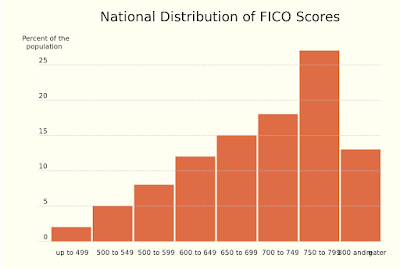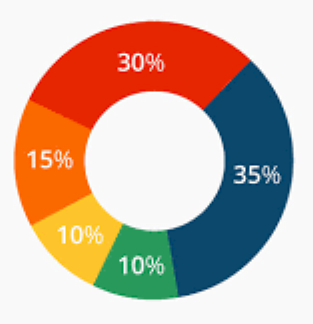In USA, are you above an average credit score?
In USA, are you above an average credit score?
Which credit score range do you belong?
Your credit report is very important to get any type of loan.
What are Credit Scores?
Before you get a loan, the lender will know, if you are
eligible for a loan or not. That's why he checks your credit score and compares
it with the credit score range first.
Not only in the USA, it is said that your character is not
as important as your credit score ...! That is, these are not just jokes. This
is the truth
Let's know what is the average credit score in the USA and what the credit score range should be for getting any type of personal loan, car loan, home loan or credit cards.
In USA, FICO developed the credit score most lenders use to
determine your credit worthiness. Each of the three major credit bureaus
(Equifax, Experian and TransUnion) have a FICO score for you.
The calculation they use is the same, but sometimes they don’t all have the same information, so your credit score may vary slightly among the three. 300 to 850 is the FICO credit score range for consumers.
Each of the three credit bureaus also has its own credit
scoring model. Credit scores are educational for consumers, although lenders
don’t use these. To determine the score, the credit bureaus use credit
information in the specific credit report. Here are the credit score ranges for
each of these credit bureaus:
Equifax: Equifax Credit Score Range in America
- 280 to 850
Experian: PLUS Credit Score Score Range in America
- 330 to 830
TransUnion: TransRisk Credit Score Range Score in America
- 300 to 850
The three major credit bureaus also jointly created the
VantageScore credit scoring model. It’s maintain and managed by an independent
company. Some lenders may use the VantageScore in determining someone’s credit
worthiness.
What is credit score range for VantageScore?
VantageScore has three versions: VantageScore 1.0 and 2.0,
which use a score range of 501 to 990, and VantageScore 3.0, which uses a credit
score range of 300 to 850.
To add to the confusion, even more scores are available to
consumers. They include the CE Score, Credit Optics Score, CoreLogic and
RiskView. Just because lenders don’t use these scores doesn’t mean they can’t
be helpful.
If you use one of these scores or a service that provides
you with one of these scores, it can be a useful monitoring tool. These
services use information in your credit report to calculate your score.
If you have a goal to increase your credit score to qualify
for a loan in the future, you will be able to see if your score is increasing. By
using one of these and continuing to monitor your score, you can see how you’re
doing using a big picture. If you score drops significantly and you don’t know
why, it can be an indication of an error on your credit report.
What is average credit score in USA?
According to consumer credit expert John Ulzheimer, the
average American’s FICO score crested 700 for the first time in 2017, an
all-time high. “A score of 700 gets you to about the 50th percentile
nationally,” Ulzheimer says.
Bad Credit: 300-650
A score below 650 means you’ll have a harder time qualifying
for loans or credit cards, and may have to pay much higher interest rates when
you do.
“A score of 650 is generally used as the dividing line
between prime and subprime,” Ulzheimer says, referring to the point at which
lenders consider you a much greater risk.
Fair Credit: 651-700
The average American’s FICO score crested 700 for the first
time in 2017, an all-time high. “A score of 700 gets you to about the 50th
percentile nationally,” Ulzheimer says.
Good Credit: 701-759
If your credit falls within this range, Ulzheimer says,
you’re likely to get approved for whatever you’re applying for. But, he adds,
“There’s no guarantee you’re going to get the best deal the lender has to
offer.”
Excellent Credit: 760 and above
Ulzheimer says a score of 720 is enough to get the best
published interest rates on an auto loan, but the best mortgage rates are only
available to people with credit scores above 760.
“So, I’d define an ‘excellent’ credit score as one that
ensures the best possible deals across all lending environments, which is 760
or above,” Ulzheimer says. In fact, in practical terms, Ulzheimer says a
perfect 850 credit score is no better than a 760.
Let’s understand what your credit score means?
Why you have several of them, how they’re calculated, and
how to improve a bad credit score.
A good credit score can make your life much, much easier.
It’s easier to get a
loan: Most people know that bad credit can make it hard to get a mortgage,
a credit card, or an installment loan. And even if you can get a creditor to
give you a chance, you’ll probably be paying a much higher interest rate than
you would if you had a good credit score.
Bad credit also means you are getting a cosigner or putting
up collateral.
It can be easier to
get a job: Though a handful of states have outlawed or limited the
practice, in most cases, prospective employers are allowed to check your
credit. Though they won’t see your score, they’ll still see any major problems
dragging it down, such as frequently missed payments or legal issues. Black
marks can indicate a lack of responsibility and potentially cost you a job
offer. Regulatory agencies can also refuse to license professionals with poor
credit.
Your insurance rates
may be lower: If you have a good credit score, you could pay less —
sometimes much less — for car and property insurance than someone with bad
credit. That’s because insurers’ research shows that you’re more likely to file
a claim if you have bad credit, which makes you a riskier customer. A few
states (California, Maryland, and Hawaii) do prohibit this practice.
It can help you
launch a small business: Your personal credit may be all you have to go on
when you need to borrow money for a fledgling business. It can get extremely difficult if
you have a bad credit score.
It can help you get
an apartment: good credit is essential for getting a mortgage, but it can
also help you get a good apartment. On the flip side, prospective landlords may
refuse to rent to you — or charge you higher rent — if you have bad credit
because they’re worried you won’t pay the rent on time.
As you can see, good credit is about more than borrowing money — it can help you in deeply personal ways, from easing your apartment hunt to landing your dream job. .
Labels
Finance





















Post A Comment
No comments :